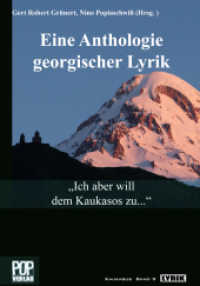- ホーム
- > 洋書
- > 英文書
- > Business / Economics
Full Description
This volume includes discussions on the many ways human societies benefit from tourism through new forms of economic activity leading to greater wealth. Tourism also strongly enhances human perception of the world. Through its physiological and psychological elements, it promotes human welfare, due to both the enjoyment of discovering new territories as well as increased contacts with near or far away societies and cultures.
Some serious concerns arising from the growth of the tourist industry are also addressed. These are mostly associated with social transformations and ecological impacts. Many ancient local cultures are practically losing their identity due to their societies having orientated their economy only to this industry. Both the natural and cultural, rural or urban, landscapes are also paying a high price for certain forms of tourism. Natural ecosystems are now becoming a rarity on the planet and ecologists talk today about 'socio-ecosystems'. These problems will persist if economic benefit is the only target, leading to short-lived financial gains that become ruinous in the long term. The visitors' increasing cultural and environmental demands also impose major challenges. Expanding environmental education in the tourist sector can contribute to addressing these concerns.
Technological and social developments associated with tourism play an important environmental role by strongly affecting natural changes inherent in the Earth's ecosystem (the 'ecosphere'). Also, technological and social changes are inherent to mankind (the 'noosphere') and are now becoming widespread. Cities are growing rapidly and industry requires increasingly larger areas. Many traditional rural areas are being abandoned. However, many historic agricultural districts have maintained, or even recovered, their local population numbers through intelligent tourism strategies focused on nature and rural culture. Natural landscapes and biodiversity are becoming increasingly appreciated. The book provides some indications on how the tourism industry could respond to these aspirations
Contents
Section 1: Sustainable tourism implementation
Changing faces of Croatian tourism; The place of tourism in the implementation of the Sustainable Development Goals at national level; Management of sustainable tourism in tourist destination ports: The use of sustainable indicators in the case study of Piraeus Port, Greece
Section 2: Strategies and sustainable business models
The future of competitive advantage in the hotel industry: ESG initiatives as a key differentiator; Using agriculture to improve and increase the sustainable tourism
industry in Idaho, USA; Characterisation of short-term rentals in Granada, Spain: Spatial analysis; Public transport as an opportunity to promote tourist homes in urban
peripheries: The case of Madrid, Spain
Section 3: Destination management
SWOT analysis for the development of strategies to design sustainable tourism indicators in Galapagos, Ecuador; Effects of local planting on the urban microclimate: A case study in a touristic city in Italy; Tourism and sustainable destinations: A bibliometric examination; Tourism carrying capacity of geosites on Santa Cruz Island, Galapagos,
for its sustainability; Transformation design for responsible tourism: A paradigm shift for
local community empowerment and well-being in destination; Service learning: A technique that enhances university students' social skills
Section 4: Cultural, heritage and gastronomic tourism
Developing sustainable indigenous tourism based on education: A comparison between Japan and Canada; Impact assessment of urban heritage sites: The case of Khor Dubai, UAE; Converting a local market into a tourist destination: The case of Plaza
de Mercado Las Ferias, Bogotá, Colombia
Section 5: Tourism and the environment
Environmental impact of cruise tourism: Exploring mitigation case studies in major ports; Air pollution from cruise ships during hotelling in ports: A case study in Ancona harbour, Italy; Green dreams in urban borderland: The ecotourism development transformation under the context of policy in Xishuangbanna, Yunnan Province, China; Integrated coastal management in emerging tourist destinations on the Mexican Caribbean coast; The end of a war = the exploration of untouched lands: An investigation into how ecotourism can play a key role in building a lasting peace in Colombia; Are ocean users ocean literate? A case study of recreationists and tourists in Cape Town, South Africa








